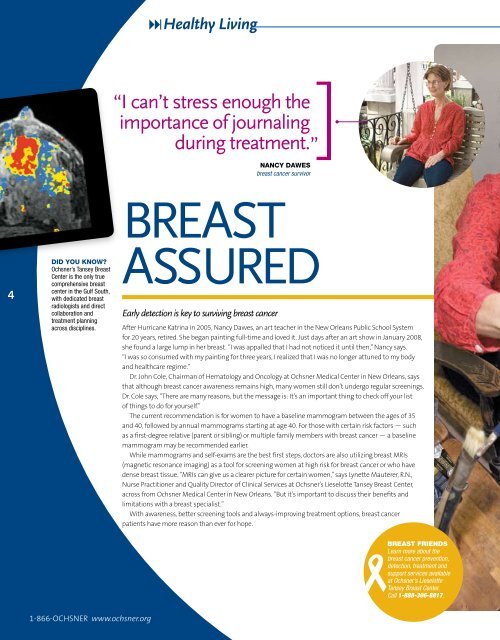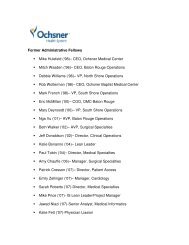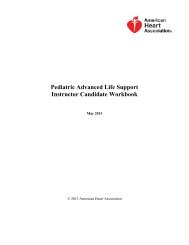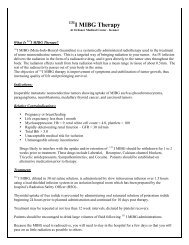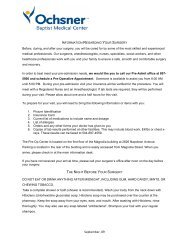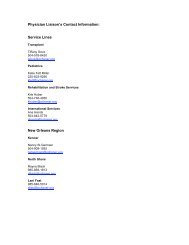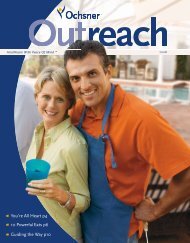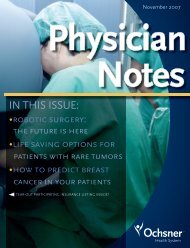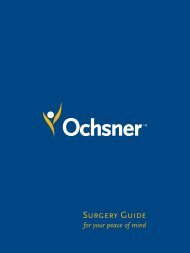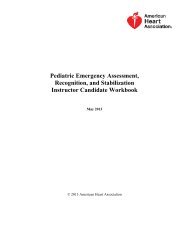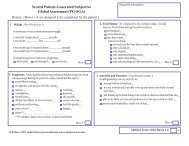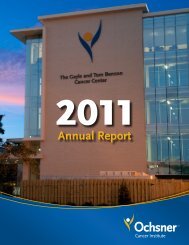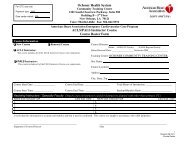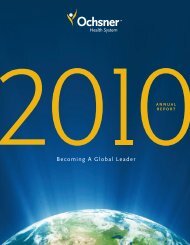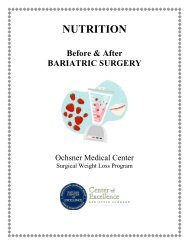NANCY DAWES - Ochsner.org
NANCY DAWES - Ochsner.org
NANCY DAWES - Ochsner.org
Create successful ePaper yourself
Turn your PDF publications into a flip-book with our unique Google optimized e-Paper software.
[”<br />
:Healthy Living<br />
“I can’t stress enough the<br />
importance of journaling<br />
during treatment.<br />
Nancy DaweS<br />
breast cancer survivor<br />
4<br />
DID YOU KNOW?<br />
<strong>Ochsner</strong>’s Tansey Breast<br />
Center is the only true<br />
comprehensive breast<br />
center in the Gulf South,<br />
with dedicated breast<br />
radiologists and direct<br />
collaboration and<br />
treatment planning<br />
across disciplines.<br />
Breast<br />
assured<br />
Early detection is key to surviving breast cancer<br />
After Hurricane Katrina in 2005, Nancy Dawes, an art teacher in the New Orleans Public School System<br />
for 20 years, retired. She began painting full-time and loved it. Just days after an art show in January 2008,<br />
she found a large lump in her breast. “I was appalled that I had not noticed it until then,” Nancy says.<br />
“I was so consumed with my painting for three years, I realized that I was no longer attuned to my body<br />
and healthcare regime.”<br />
Dr. John Cole, Chairman of Hematology and Oncology at <strong>Ochsner</strong> Medical Center in New Orleans, says<br />
that although breast cancer awareness remains high, many women still don’t undergo regular screenings.<br />
Dr. Cole says, “There are many reasons, but the message is: It’s an important thing to check off your list<br />
of things to do for yourself.”<br />
The current recommendation is for women to have a baseline mammogram between the ages of 35<br />
and 40, followed by annual mammograms starting at age 40. For those with certain risk factors — such<br />
as a first-degree relative (parent or sibling) or multiple family members with breast cancer — a baseline<br />
mammogram may be recommended earlier.<br />
While mammograms and self-exams are the best first steps, doctors are also utilizing breast MRIs<br />
(magnetic resonance imaging) as a tool for screening women at high risk for breast cancer or who have<br />
dense breast tissue. “MRIs can give us a clearer picture for certain women,” says Lynette Mauterer, R.N.,<br />
Nurse Practitioner and Quality Director of Clinical Services at <strong>Ochsner</strong>’s Lieselotte Tansey Breast Center,<br />
across from <strong>Ochsner</strong> Medical Center in New Orleans. “But it’s important to discuss their benefits and<br />
limitations with a breast specialist.”<br />
With awareness, better screening tools and always-improving treatment options, breast cancer<br />
patients have more reason than ever for hope.<br />
-BREAST FRIENDS<br />
Learn more about the<br />
breast cancer prevention,<br />
detection, treatment and<br />
support services available<br />
at <strong>Ochsner</strong>’s Lieselotte<br />
Tansey Breast Center.<br />
Call 1-888-306-8817.<br />
1-866-<strong>Ochsner</strong> www.ochsner.<strong>org</strong>


